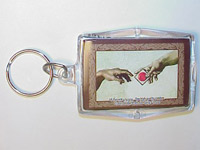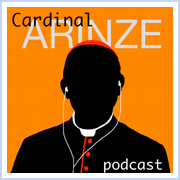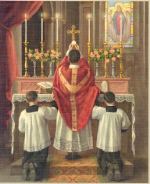Defenders of Archbishop Burke
I APOLOGIZE FOR THE LATE NOTICE!!!
I received this today, (I just returned from the Marian Conference):
If you have not heard, a group is forming to show especially the media that Archbishop Burke is not universally reviled in our Archdiocese.And the Message from the Defenders:
The Archbishop will be formally installing the pastor at St. Agatha's this coming Sunday at 10 a.m., and the Mr. McKenzie says the Vicar General, Monsignor Gardin, has encouraged anyone who wants to come and show support for the Archbishop to attend this Mass. I figure the Credo folks will especially want to be there.
I am happy to report that our press release garnered quite a bit of attention Friday, and the attention continues.
Here is what I am aware of that happened in the media today (let me know if I missed anything):Fox News 2 carried a report this morning that repeated all the points from the press release
I gave an interview to KTRS radio (AM 550) which they used in segments throughout the day during their local news. The ones I heard were balanced.
I gave an interview to "Metro Network News" that supplies news in digest form to approximately 30 St. Louis FM stations. You may be hearing segments in the next few days.
I gave a telephone interview to a reporter for the Post-Dispatch who wants to put an article in Saturday's paper and cover the Mass on Sunday.
I have been contacted by a producer and photographer at KMOV TV who are both interested in arranging an interview.
From now until Sunday I will be promoting the Mass at St. Agatha's to the media. They tell me that they will be there and we will be on the Sunday evening news (and I believe it because traditionally Sunday is a slow news day). Because the cameras will be rolling it is vital that we have visuals for them. This means posters, signs, placards, you name it - anything visual that they can show on the screen while they play their audio. They will show the crowd of course but since each shot only takes a few seconds we need to give them a rich visual environment (colorful clothes anyone?)
The Name of the Game - Signs!
This is the area in which the members of the Defenders can really help our efforts on Sunday. If you are coming to the Mass, and if you have the ability to make a sign please do so. Here are some suggested messages:
We Love Archbishop Burke!
God Bless Archbishop Burke!
We Support Archbishop Burke
St. Stan's Come Back! We Miss You!
If you want to use a different message just make sure it is positive, not critical. It is to our advantage if we have a wide selection of hand-lettered signs (as opposed to duplicate machine-made signs). This gives the camera more visual variety to work with. The Mass on Sunday is beginning to look like a very important event for us. We are going there to support the Archbishop, but the media will use it to introduce our group to their audiences. I hope we impress them favorably.
Remember, some members of the media have accepted the interpretation given out by the St. Stan's board of directors: that Christ was a rebel and so are the people at St. Stanislaus. You know what that makes the Archbishop and those faithful to him don't you? That's right. The Pharisees. We have to counteract that image.
Image is very important when you deal with the media. Our words and image must match. If we say we love the Archbishop and the people of St. Stanislaus we must look like loving people. On TV that means smiles or at least not frowning. If you see me not smiling please kick me. Gradually we will change the perception. We and the Archbishop will no longer be seen as Pharisees but as mild and loving Catholics - which is exactly what we are.
Directions to St. Agatha's Church
The address of St. Agatha's is 3239 S. 9th Street, St. Louis MO 63118. It is just a little south of the brewery. From Highways 40 or 44 get on Broadway and go south to Arsenal Street. Turn right on Arsenal and left on 9th Street. Go two blocks to the Church. From Hwy. 55 get off at Arsenal Street and go east. Turn right on 9th Street. Go two blocks to the Church. There is parking on the lot behind the church and on the street.
I will have a sign saying "Defenders of Archbishop Burke". Please join me, with your sign if you have one (you shy people may want to have a sign just to hide behind). Please be there by 9:00 A.ME. for the convenience of the media. I will send a press release out tomorrow to the media telling them that we will be there early if they would like a statement or some footage.
You do not have to speak to the media if you don't want to. I will be making statements for the group. If they want comments from our members (and they probably will) you are welcome to do so if you wish (comments are like signs - the more signs and comments, the better - and longer - the news report will be) but there is absolutely no obligation to do so. It is also up to you to provide your name to the reporter. If you don't want them to have your name don't give it!
If you decide to make a statement please try to include a sentence about how you pray that the people at St. Stanislaus will realize their mistake and come back to the Church. Tell them we miss them! Tell them we are in a state of mourning over the split! Tell them they will always be welcome in the Church of their forefathers. Tell them you pray for them (if you do). I deeply believe all these things and I hope you do too. Catholics want everyone to be Catholic right? Even the naughty ones.
So to review for the media. We want to keep it simple and focus on:
Our love for Archbishop Burke
Our love for the people of St. Stanislaus
If they try to get you to criticize the board of directors or the people of St. Stanislaus don't take the bait! Just say that deep down they know as Catholics that what they did is wrong and that you want them to come home. I hope we can reach some of the board members' wives through TV. They must be heartbroken at what their husbands have done.
Feel free to attend the Mass. That's what the Archbishop invited us there for. Let's gather again outside after Mass in case there are any tardy members of the media and to become better acquainted with one another. I am looking forward to meeting all of you faithful Catholics!
Remember, producing good newsworthy public events to show our support for the Archbishop is one of the primary reasons Defenders of Archbishop Burke came into existence. A good showing Sunday will go a long way towards meeting that goal. Let's make it count! I keep the media posted about our numbers. If we have, for example 130 members (as we did as of 1-13-06) and only five members show up it won't look so good.
Many of you Defenders are emailing me with information and encouragement. I really appreciate this but it takes me time to ascertain if the email is from a new or existing member. We are already up to 130 members and I cannot remember everyone's name. Therefore please write "I am already a member" on the top of your email if you are already a member. That way I won't waste time signing you up twice and you won't receive duplicate emails. Thanks for your consideration.
If you are a recent member and wonder what our previous messages said you are welcome to email me and request copies. So far we have had:
Announcing: DEFENDERS OF ARCHBISHOP BURKE
First Opportunity to help the Archbishop (about the Mass at St. Agatha's)
Pray for those in schism
Press Release: It's Not Too Late For St. Stanislaus!
God bless,
Bill McKenzie
Defenders of Archbishop Burke











